In China, you can often see queues of people buying steamed pork-filled buns taken out from bamboo steamers as their breakfast in the early morning. The stunning Shanghai small steamed buns are also cooked and served in bamboo steamers. As a conventional cooking tool for Chinese families, bamboo steamers are not only used to cook luscious buns, dumplings, and a variety of Cantonese dim sum but are also applied to steam rice, vegetables, fish, and meat. This is a guide on how to use your bamboo steamer to make yummy dishes.
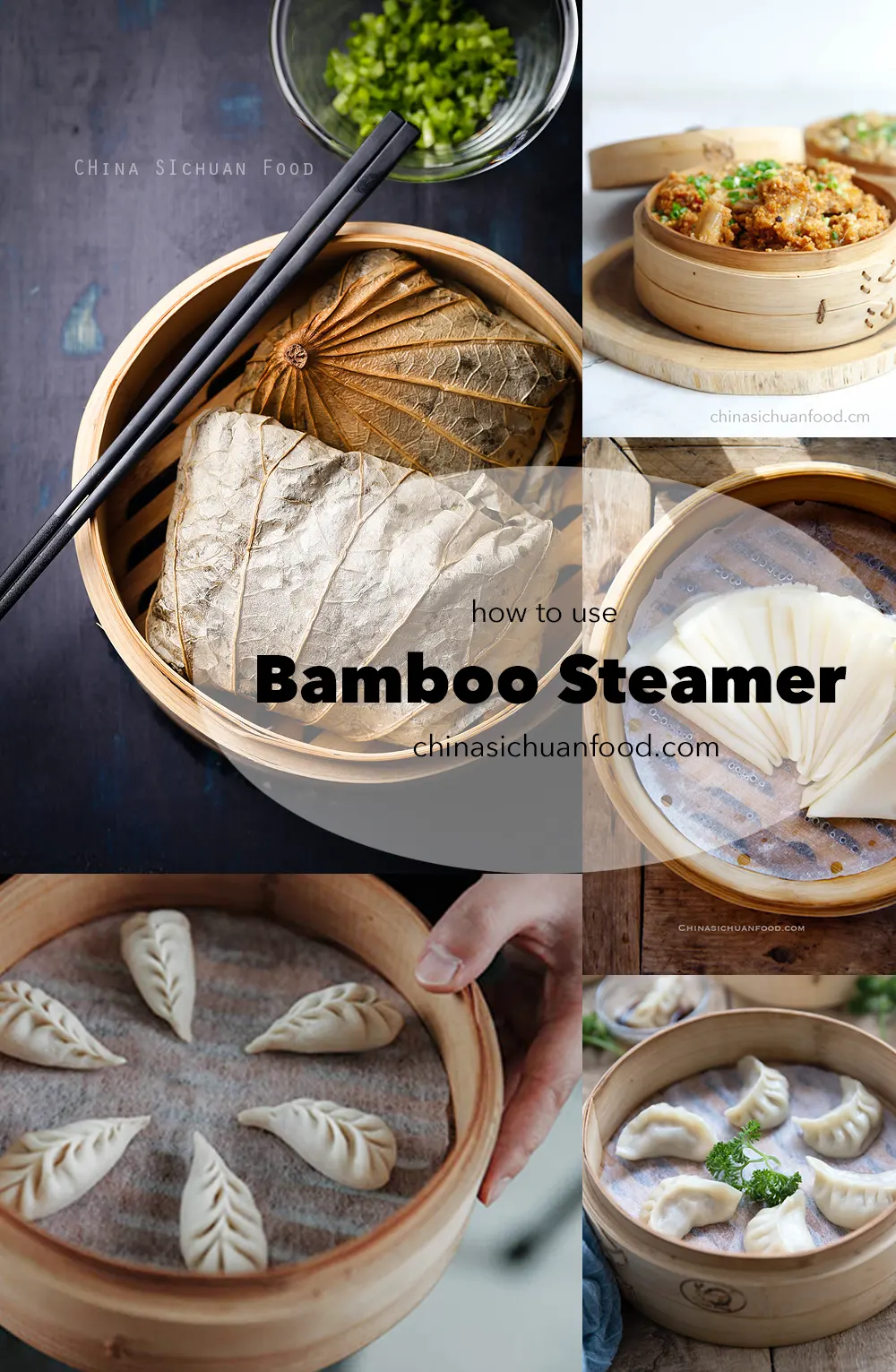
Materials of bamboo steamers?
Bamboo steamers or bamboo steamer baskets are lightweight cooking tools made of natural bamboo, which is peeled and split into quite thin bamboo strips with a thickness of 5-6mm. The bamboo strips are then woven by the craftsmen and with other sophisticated procedures, a handmade bamboo steamer can be completed. It is not easy to learn the skills of making bamboo steamers, which have been regarded as old folk art in China.
A bamboo steamer is composed of a dome-shaped lid and bamboo steamer baskets. You can take only one steamer basket for use or you can use a couple of baskets together at one time. The design of several stackable tiers makes it possible to cook different servings simultaneously. The dish which needs more time for steaming should be put on the top layer.
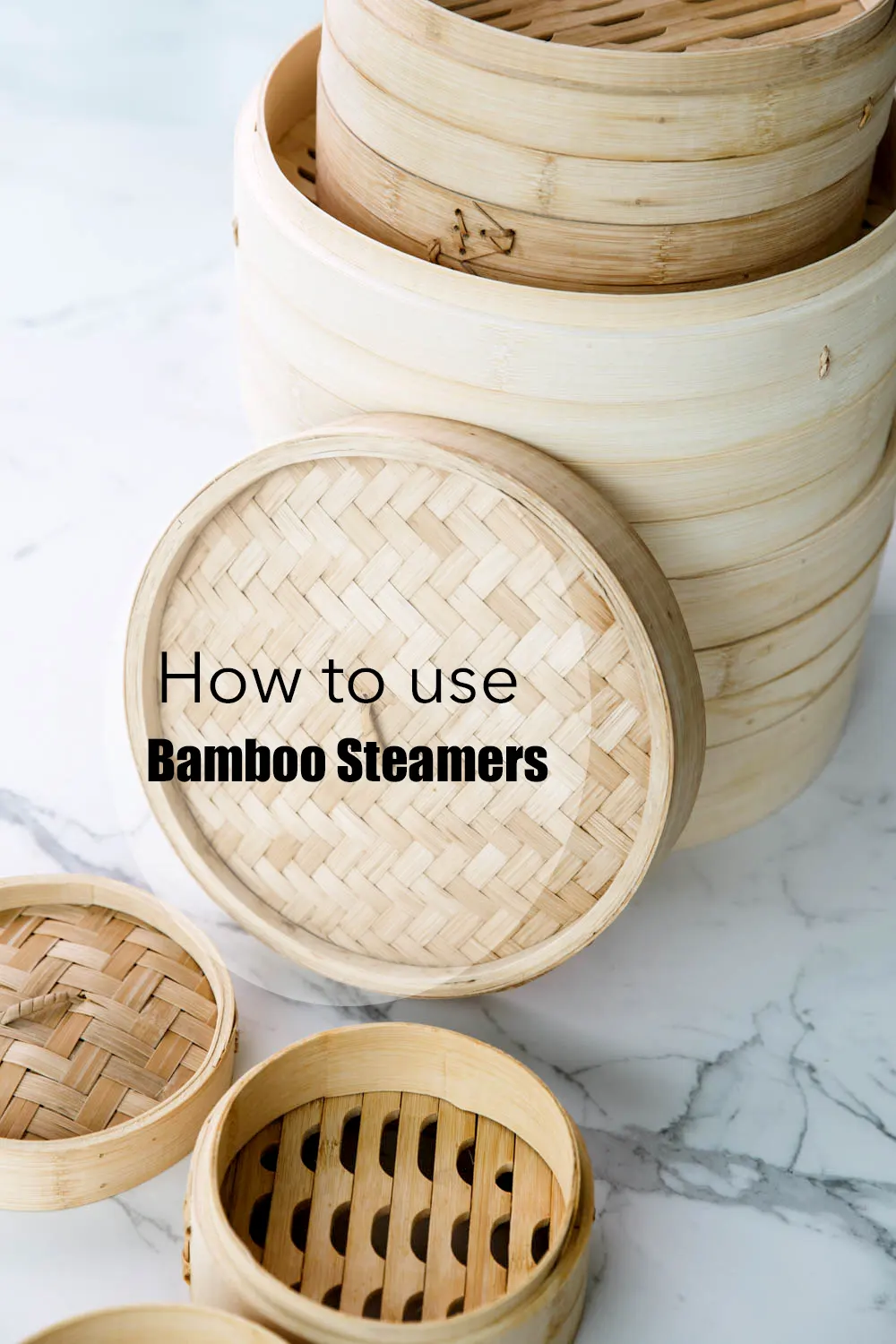
How bamboo steamer works
A bamboo steamer is work through steaming. The water is heated to a boil and then turn the water into vapor or vessel. The vessel will go through the small holes at the bottom of the steamer and the lattice of the bamboo steamer, bring heat to food, and cook them in an evenly and softer way.
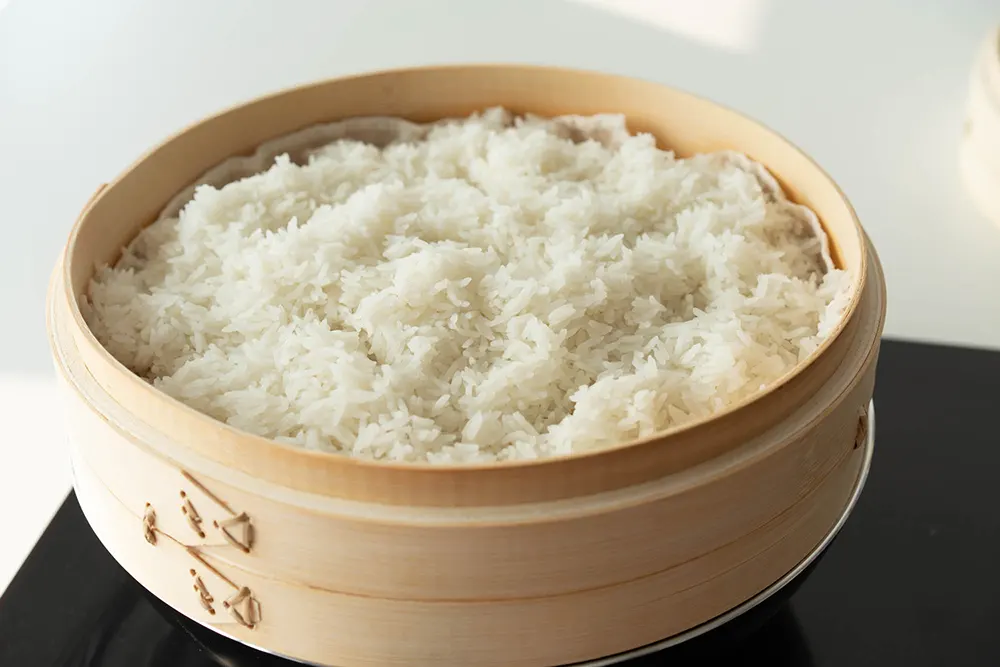
Where are bamboo steamers from?
Bamboo steamers are a centuries-old cooking method originating from China. Today, bamboo steamers are commonly used in Asian cuisines such as dim sum and Japanese and Korean dishes. Bamboo steamers consist of bamboo baskets with lids, which can be stacked for convenient steaming. Heat is produced by directly suspending the bamboo baskets over boiling liquid.
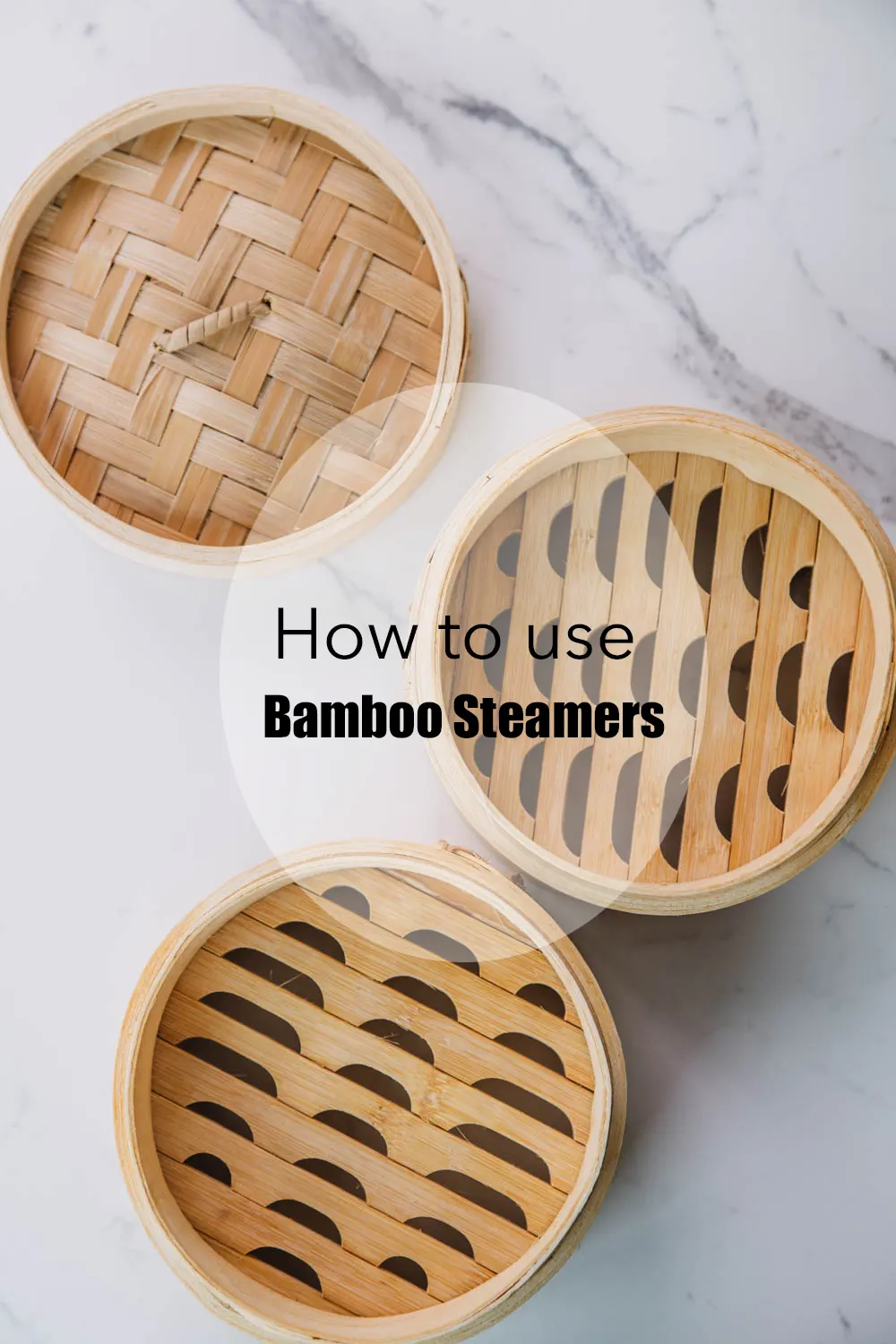
Are bamboo steamers healthy?
Bamboo steamers are an increasingly popular way to cook food due to the potential health benefits that come with using this cooking method. Unlike traditional steamers made from metal or plastic, bamboo steamers can better preserve the nutritional content of food because they do not require grease or oil. Additionally, bamboo steamers retain more moisture and flavor in cooked food due to their breathable bamboo construction and tight-fitting lids. Steaming your food is always a healthy way of cooking.
How long do bamboo steamers last?
A bamboo steamer is quite expensive, so you may wonder whether a bamboo steamer is durable or not. When used properly, bamboo steamers can last a surprisingly long time, with many people finding that they have bamboo steamers that have been in their family for several generations. However, all bamboo steamers will eventually require replacement, as exposure to heat and moisture will cause the bamboo material to eventually break down over time. Taking proper care of a bamboo steamer can help elongate its life, such as drying it out after use or not washing it with anything too abrasive. Whether one’s bamboo steamer is brand new or has been in the family for decades, it is important to be aware of how quickly bamboo materials age in order to ensure maximum longevity-and eating pleasure!-from this beloved kitchen utensil.
Different sizes of Bamboo steamer
Bamboo steamers come in several different sizes, ranging from the mini-sized 4-inch diameter steamer up to a 12-inch diameter model. You need to consider the size of the steamer because it will determine how much food you can cook at once. For example, a 4-inch steamer can fit two or three small dumplings or buns, whereas a 12-inch steamer could fit dozens of them at once.
Before the first use
After receiving a brand new bamboo steamer, some treatments should be conducted ahead. It is quite necessary to steam the steamer without any content to remove the raw taste and the yellow color.
- Wash the bamboo steamer thoroughly with warm water.
- Prepare a wok and add an appropriate amount of water to the wok.
- Place the bamboo steamer in the wok and ensure that the water has just reached the bottom of the bamboo steamer.
- Put the lid on and continually heat for about 15 minutes.
- Pay attention to the water amount in the wok and add some water timely so as to prevent the edge of the bamboo steamer from being scorched.
- Then wash the steamer with warm water again, drain it completely, and store it well for the next time of use.
The above treatments to the new bamboo steamer aim to eliminate the yellow liquid in the bamboo. After that, you can use the unique cooking tool to make a steamed dish.
Where to buy the bamboo steamer
I will recommend you purchase it from amazon or check it out in Asian stores.
How to set up a bamboo steamer
To set up a steamer, we need two parts of equipment.
A wok, skillet, stewing pot
A bamboo steamer cannot be used alone but should be matched with a wok, a skillet, or a stewing pot. You should choose a bamboo steamer in a suitable size to be matched with your cooking tool first. It is recommended that the inside diameter of the bamboo steamer should be 3cm smaller than that of your cooking tool. Therefore, the bamboo steamer can be set firmly on the cooking tool.
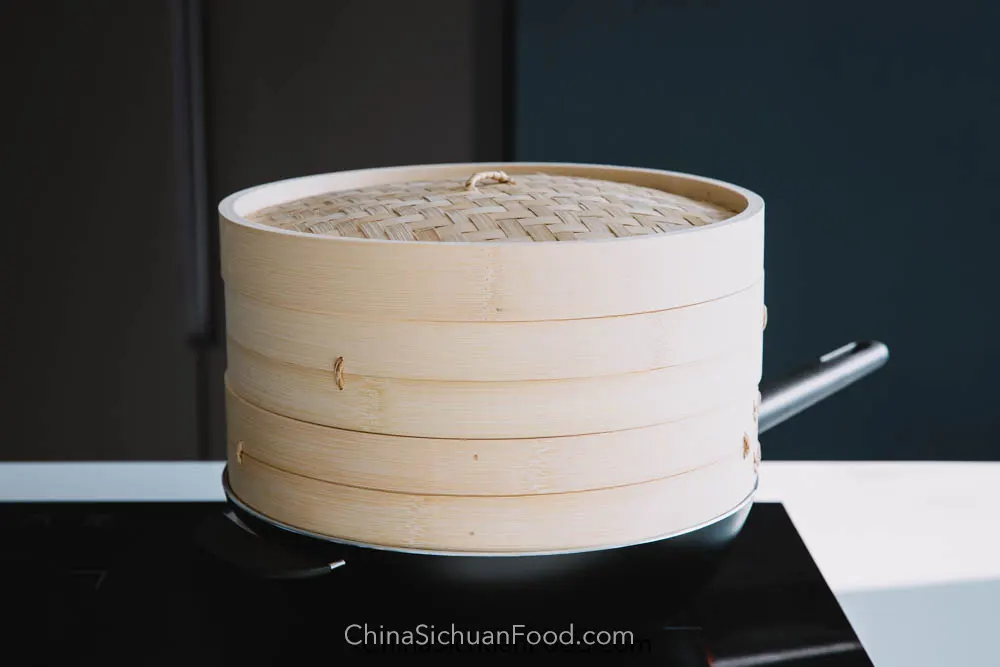
Liners
When cooking with a bamboo steamer, you also need to use a liner. Before cooking, a liner should be put into the steamer basket, which can prevent food from sticking to the steamer basket, especially when you make dumplings or buns. You can find that liners are usually round in shape and are mainly made of cotton, paper, and food-grade silicone. Both cotton liners and silicone liners are reusable. When using a cotton liner, you should first immerse the liner in water for a while and then wring it out before cooking.
In addition to the commonly used kitchen liner, fresh leaves can also be used as a liner for the bamboo steamer. For example banana leaves or lotus leaves.
Another popular liner is parchment paper, which can prevent the food from sticking to the bottom of the bamboo steamer.
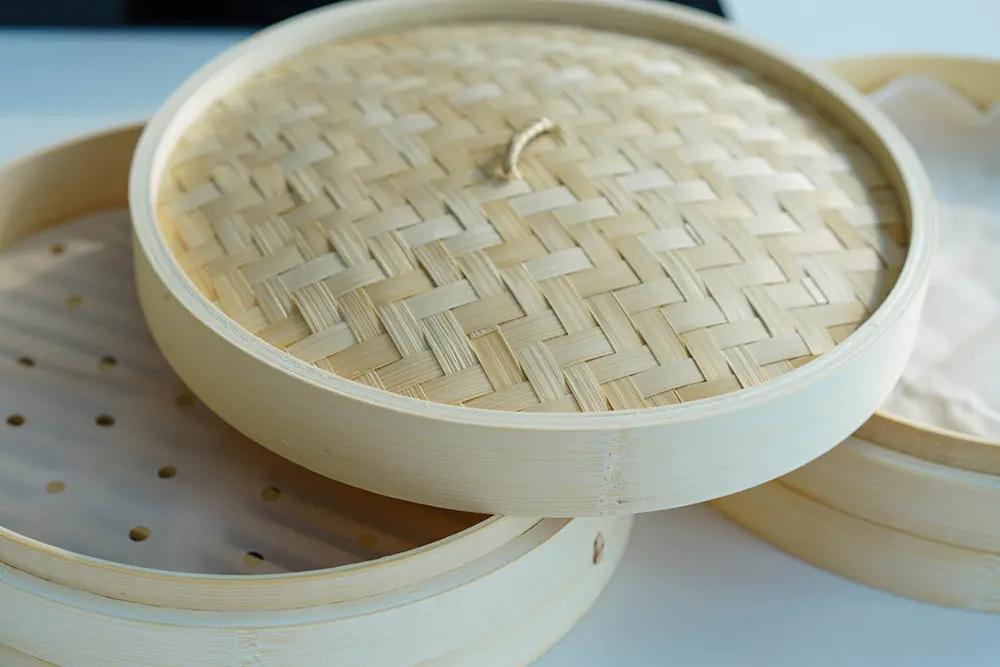
Watch out for the water level
When using a bamboo steamer, it is very important to watch out for the water level. In the process of cooking, you should also keep an eye on whether there is a need to add some water. Also, you should avoid removing the lid frequently, which will make the steam leak and extend the cooking time.
How to clean bamboo steamers
- After using the bamboo steamer, you need to carefully wash the steamer baskets and lids with warm water or hot water. Then keep them separately to dry in the air.
- After that, it should be dried in the air and stored in a cool place to prevent it from being spoiled by molds and mildews. Avoid direct sunshine to avoid deformation.
- Bamboo steamers can be only hand-washed. Don’t please them in a dishwasher. You can use brushes to wash the bottom of the baskets if food is sticky to the bottom.
What is the difference between a bamboo steamer and a stainless steel steamer?
The bamboo steamer has tiny holes in its lids which allow steam to enter the vessel and cook the food. Unlike a metal steamer, bamboo steamers have an earthy feel as well as insulating properties that help retain heat, effectively trapping steam around the food. This allows for a slow, gentle cooking process which helps preserve the moisture and flavor of the food cooked within it.
The most difference is used for steamed buns or other food which might be spoiled by dropped water which may cause bumps on the surface.
Cooking with bamboo steamer
use a bamboo steamer to steam rice
Compared with rice cooked by a rice cooker, rice cooked by a bamboo steamer is much softer and has a fresh scent of bamboo. You can use the bamboo steamer to steam rice, glutinous rice, and other grains. It is quite easy for you to use a bamboo steamer to steam rice. Firstly, rinse the rice and then cook the rice for about 5 minutes in boiling water, and then put the rice into the steamer basket to steam for about 15 minutes. The rice with this processing is super fluffy and best for fried rice. We call this type of steamed rice “沥米饭” meaning rice with extra starch removed.
Another way of steaming rice is to steam soaked rice. This is a common way of cooking sticky rice, also known as glutinous rice. Soak the rice in clean water for 3- 4 hours and then directly steam in a steamer with a liner.
Use a bamboo steamer to steam dumplings
Bamboo steamers are the optimal cooking tool for steam dumplings. With no condensation water formed in the bamboo steamer, the dumplings can keep good shape and embrace the natural fragrance of bamboo. It only takes about 15-20 minutes to steam dumplings with a bamboo steamer.
Steam vegetables
Vegetables such as carrots, corn, potatoes, sweet potatoes, yams, broccoli, and so on can all be steamed, and you will get an oil-free diet. Before steaming vegetables, you’d better chop them into suitable shapes and sizes to make the cooking more efficient.
Some vegetables may take a shorter time to steam, such as broccoli and purple cabbage, nevertheless, others like potatoes or yams may take a longer time. Therefore, you can cook the vegetables which need more time at first, and after a few minutes put in other vegetables easy to be cooked.
Use a bamboo steamer to steam steamed buns
The bamboo steamer is the ultimate tool for making traditional Chinese steamed buns. This ancient device has been used in Asian countries for centuries and has been praised for its superior properties. A bamboo steamer is made from natural materials means that none of the buns’ delicious flavors will be contaminated or altered by dangerous toxins. In addition, it can add a faint bamboo aroma.
Bamboo steamers are perfect for making buns and dumplings because bamboo steamers are capable of absorbing excess moisture so as to prevent condensation water to accumulate on lids. Otherwise, water on the lids will drop on the surface of the buns, which will influence the shapes and flavors of foods.
Following are some dishes you can try to make with bamboo steamers.


This is so helpful — I’ve always wanted to use a bamboo steamer (we used a metal one at home growing up), but was uncertain of how to use it & clean it. 感謝你
My pleasure. Dear! Happy cooking!